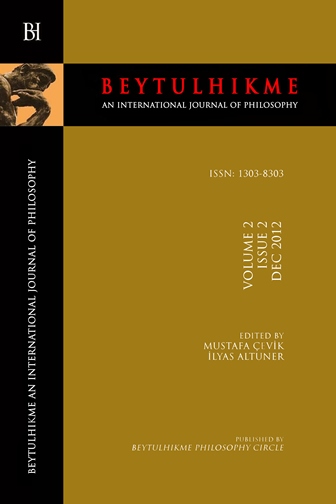Author :
Abstract
Heidegger’in en önemli ve bize göre diğer filozoflardan ayrılan en belirgin özelliği, düşüncelerini dile getirirken dilsel bağlamda yaptığı çözümlemeler ve oluşturduğu kavramsal yeniliklerdir. Ontolojisinin temeline yerleştirdiği ve insan varlığı anlamına gelen “Dasein” terimi de bunlardan biri, belki de en önemlisidir. Dasein, varlığın temeli, anlamı ve sonudur. Bunun yanı sıra tamamlanmamış bir varlıktır. Dasein’ın kendi varlığını ancak ölüm ile ikmal edeceğini öne süren Heidegger, bu durumu sum moribundus (ölüm de var olan ben) olarak kavramsallaştırır. Biz bu çalışmada “ölüme yönelik bir varlık olarak Dasein”ın özdeşliğine ulaşma imkânının mahiyetini ve bu çerçevede Kartezyen özne (cogito sum) ile olan ilişkisini ele almaya çalışacağız. <
Keywords
Abstract
Heidegger’s most important and distinguished feature from the other philosophers, to us, is his linguistic analysis when he explain his ideas and his putting forward conceptual innovations. The word Dasein that Heidegger used it as a synonym for "human entity" and settled it in the basis of his ontology is one of those terms, possibly the most important one. Dasein is ground, meaning and end of Being. Besides, it is an incomplete Being. It only can reach its totality and completeness with death. Thus, Heidegger sometimes called it as sum moribundus (I am in dying). In this study, we try to examine the nature of its possibility to get its identity as a being-toward death. And in this context, we try to take up its relation with Cartesian subject (cogito sum).<
Keywords
- Guignon, C.B. (1993). Authenticity, Moral Values, Psychotherapy. The Cambridge
- Haar, M. (1993). Heidegger and the Essence of Man (trans. W. McNeill). New York: State University of New York Press.
- Heidegger, M. (1985). History of the Concept of Time: Prolegomena (trans. T. Kisiel). Bloomington: Indiana University Press.
- Heidegger, M. (1997). Özdeşlik ve Ayırım (çev. N. Aça). Ankara: Bilim ve Sanat Ya- yınları.
- Heidegger, M. (2003). Metafizik Nedir? (çev. M.Ş. İpşiroğlu & S.K. Yetkin). İstan- bul: Kaknüs Yayınları.
- Heidegger, M. (2006). Varlık ve Zaman (çev. K.H. Ökten). İstanbul: Agora Kitap.
- Hoffman, P. (1993). Death, Time, History: Division II of Being and Time. The Cambridge Companion to Heidegger (ed. C.B. Guignon). Cambridge: Cambridge University Press.
- İyi, S. (1999). Çağımızda Metafizik Sorunu. Ankara: Ayraç Yayınevi.
- Mansbach, A. (2012). Heidegger's Critique of Cartesianism. http://www.bu.edu/ wcp/Papers/Cont/ContMans.htm.
- Marion, J.-L. (2002). The Ego and Dasein, Heidegger Reexamined. Language and the Critique of Subjectivity, 4 (ed. H. Dreyfus and M. Wrathall). New York: Routledge.
- Zimmerman, M.E. (1993). Heidegger, Buddhism, and Deep Ecology. The Cambridge





